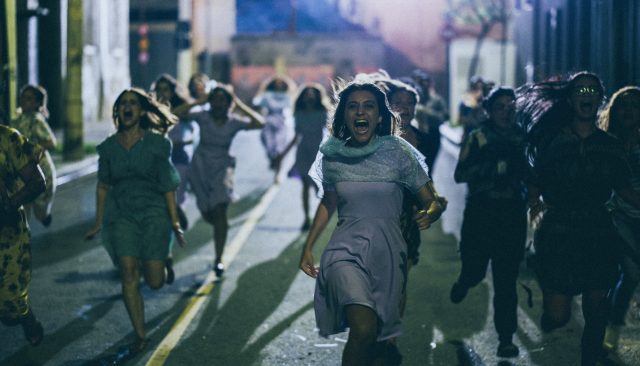AFI Fest 2021: Medusa, by David Bax

Anita Rocha da Silveira’s Medusa opens with a solo interpretative dance performance to Siouxsie and the Banshees’ “Cities in Dust” until, a couple minutes in, the camera pulls back to reveal that what we’ve been seeing is actually being watched on a phone by a young woman in the backseat of a rideshare car. The song may be 35 years old but Medusa clearly takes place in–and is about–the present day. Too bad, then, that so much of it feels old and tired.
That does not include João Atala’s sumptuous cinematography. Medusa‘s colors are so rich that the film itself feels as if it’s still wet, like freshly applied paint. Comparing sinister, colorful movies to gialli is almost reflexive at this point but sometimes it’s warranted.
Medusa is is not a giallo but it does share that genre’s tendency to hold hands with horror. Mari (Mari Oliveira), a young and beautiful Christian warrior in suburban Brazil, undertakes a search for a fabled, disfigured former model that leads her into dark rooms and basements, in one of which lurks one of the most frightening single shots I’ve seen in a movie this year.
There’s plenty to chew on when da Silveira introduces body horror, via the specter of disfigurement, into the film’s group of young women who put Christ first and their make-up routines second. They apply their layers of concealer and cute clothes almost as if, in addition to trying to win the necessary prize of a husband, they’re also trying to force their insides to match their outsides. The burns and scars that appear as Medusa goes on are like their fears about themselves becoming true and obvious.
Frustratingly, though, da Silveira chooses to focus the bulk of her satirical energy in a more facile direction. Her vision of a town in which (separate) male and female groups of young, devout Christians roam the streets at night and attack those they observe exhibiting loose or unworthy morals is pretty ridiculous but never becomes quite ridiculous enough to be funny. This is humorless satire, even if it comes from a sympathetic place. Brazil, like the U.S., is threatened by the rise of brutish right wing populism that often comes dressed up in Christianity. So is Romania, though, and Radu Jude’s Bad Luck Banging or Loony Porn is more incisive in its attacks on these trends. Medusa spends too much time on the kind of smug, anti-Christian broadsides seen in 2004’s Saved!
Mercifully, Medusa pivots back to lush, weirdo horror mode by the grand finale. It even cleverly literalizes the concept of “wokeness” to creepily hilarious effect. But at over two hours, there’s too much laziness in the middle for da Silveira to be able to recover.


























